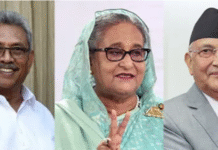
The impact of the upcoming election in Bangladesh will be felt far beyond its borders. From the US to Russia, India to China, the January 7 election is a high-stakes issue for several countries. And the traditional lines of alliances have somewhat blurred.
For India, it’s a crucial election in its immediate neighbourhood. Its decades-old influence in Bangladesh, which it helped liberate from Pakistan in 1971, is being challenged by China. To add to this, there is a definite US meddling in the election process.
“The battle for influence in Bangladesh, whether by supporting the ruling Awami League or the opposition Bangladesh Nationalist Party (BNP), has placed the US and its friends in one camp, with India, China, and Russia in another. It is really interesting to see that, in a broad stroke, India and China are on the same page regarding the issue of the Bangladesh election,” Shantanu Majumder, professor of political science at Dhaka University, tells IndiaToday.In.
The Bay of Bengal has been one of the significant reasons behind the increasing importance of Bangladesh to the US, China, and India, according to professor Majumder. “All of them are willing to strengthen their position in the northeastern part of the Indian Ocean for military, trade, and natural resources purposes.”
Some people in Dhaka believe that the US is using the issue of ‘free and fair elections’ to pressure the Sheikh Hasina government. In contrast, some blame India for taking the side of the ruling party.
“The US has taken an outsized interest in Bangladesh for some time. Bangladesh is not really part of the US’ interests-based worldview, but certainly the Awami League under Sheikh Hasina has come in for particular criticism from Washington, particularly during the elections,” Indrani Bagchi, CEO Ananta Aspen Centre and foreign policy analyst, tells IndiaToday.In.
But why is the US interested in Bangladesh’s internal politics?
“Various perceptions have been built up over the years. First, that the US opposed the creation of Bangladesh under Sheikh Mujibur Rahman, Sheikh Hasina’s father and that has persisted. Second, is that Washington finds greater comfort with the BNP and Khaleda Zia, a holdover sentiment from the old Pakistan days. Third, that Sheikh Hasina has been getting too close to China,” explains Bagchi.
This election is seen as a big test for democracy in Bangladesh and how Prime Minister Sheikh Hasina negotiates the global centrifugal forces. The results are likely to have huge repercussions for India.
THE BATTLE OF BEGUMS IN BANGLADESH
For the last three decades, the politics of Bangladesh have been the story of the two biggest political parties – the Awami League and the Bangladesh Nationalist Party – both headed by begums, as high-ranking Muslim women are referred to.
Prime Minister Sheikh Hasina leads the Awami League, a party founded by her father and Bangladesh’s first president Sheikh Mujibur Rahman. The Bangladesh Nationalist Party (BNP) is headed by Khaleda Zia, the country’s first woman prime minister.
Just ahead of the 2018 polls, Khaleda Zia was convicted in corruption cases and barred from contesting elections. The BNP, which contested the election after forming an alliance, won just seven seats, while the Awami League won 302 of the 350 seats.
Khaleda Zia, who was sentenced to 17 years in prison in 2018, was released from jail in 2020 and is under house arrest. The Bangladesh government hasn’t allowed her to fly out for medical treatment despite claims that she was at “high risk of death”.
The elections of 2014 and 2018 have been called out by opposition parties and the western media for not being free and fair. The same aspersions are being cast this time too.
“The January 2024 election in Bangladesh is going to take place without any credible opposition and with the predictable outcome that Sheikh Hasina will win for the fourth consecutive term and the Awami League will form the government. Top leaders of the major opposition BNP are in jail and hundreds and thousands of their activists are in prison,” Mubashar Hasan, an author and expert on Bangladesh politics, tells IndiaToday.In.
“The BNP is set to boycott the election as it is demanding an election under a neutral caretaker government. However, Hasina dismissed that demand, and she is going to organise an election under her administration. Against this backdrop, the next election will push Bangladesh firmly into an authoritarian trajectory,” says Hasan, a post-doctoral research fellow at the University of Oslo, Norway.
The BNP is demanding that Sheikh Hasina step down and a caretaker government be installed for the general election to be a free and fair exercise. It has taken to the streets and Bangladesh has seen large-scale violent protests in recent weeks.
Some 10,000 people, mostly opposition activists, have been arrested since October 28. Thousands of grassroots leaders have fled to remote corners of the country to avoid arrest.
Mubashar Hasan says millions of people who support the BNP are feeling disenchanted and deprived of their political rights. “There is a real worry that radical Islamist and militant Islamist outfits could manipulate such mindsets to recruit would-be jihadists,” says the Bangladesh expert.
The US has always been perceived to be close to Khaleda Zia. Its assertion of a “free and fair democratic process” is more pronounced this time.
Russia and the US engaged in a bitter war of words recently after Moscow accused Washington of planning to organise mass anti-government protests in Bangladesh.
Russian Foreign Minister Sergei Lavrov had said during his visit to Dhaka in September that “the US goal is clearly both to counter China and to isolate Russia in the region”.
Russia is helping Bangladesh build its only nuclear power plant. Western sanctions on Russia, over the Ukraine war, have delayed the project.
WHY SHEIKH HASINA IN DHAKA SUITS INDIA
Bangladesh can ill afford to snub the US. Bangladesh’s garment industry is dependent largely on the US, European countries and Japan. Any American embargo will hit Bangladesh’s economy badly, says professor Shantanu Majumder.
The US has already given a hint of its intentions.
In 2021, it imposed sanctions on Bangladesh’s Rapid Action Battalion and six of its leaders for alleged human rights abuses. In September, the US said it would put visa restrictions on people trying to undermine the democratic election process in Bangladesh.
“India has spoken to the US privately and at very high levels about India’s support for Sheikh Hasina and its concerns regarding the return of BNP-Jamaat-e-Islami in Bangladesh,” says Ananta Aspen Centre CEO Indrani Bagchi.
India fears that if BNP-Jamaat were to be back in power, it could be a return to the old extremist politics, including renewing of links with Pakistan’s jihadi groups and the ISI. India sees this as being detrimental to its own security, explains Bagchi.
India has invested in Sheikh Hasina’s Awami League government for over a decade, and across governments in New Delhi.
“Hasina has been sensitive to India’s security concerns. In return, India has been a generous neighbour, helping Bangladesh’s development as well as building connectivity to signal the economic and security interdependence between the two countries,” says Bagchi.
With Hasina at the helm, Bangladesh and India have achieved a historic land boundary agreement. The countries share electricity and fuel, and India is the first responder for Bangladesh.
“Together with Japan, India has been a reliable development partner for Bangladesh pushing back against China’s Border and Roads Initiative (BRI),” says Bagchi.
THE CHINA FACTOR IN BANGLADESH
The worry is that Washington’s pressure could be counter-productive and it might end up pushing Bangladesh further towards China.
“There is also a risk, or chance, whatever you want to call it, that the extraordinary pressure from the US will push Bangladesh further towards China. Note that the level of the Bangladesh-China relationship is at an all-time high right now. Although not always visible, any keen observer can sense Beijing’s backing for the current government,” says Dhaka University professor Shantanu Majumder.
Bangladesh is of strategic importance for China as it shares a land border with India, including in the narrow Siliguri Corridor or the ‘Chicken’s Neck’ that connects the northeastern states to the mainland.
Chinese companies have invested $26 billion in Bangladesh in the last six years. Their bilateral trade is reported to have grown by 58 per cent in the last 12 years.
China’s growing inroads into Bangladesh is certainly an area of concern for India. However, there is understanding in Bangladesh about this concern, says Indrani Bagchi.
“While Dhaka is about 70-80 per cent dependent on China for its defence equipment, spurning all Indian offers, it is also true that the Hasina government cancelled the Chinese port project in Sonadia and awarded an alternative project at Matarbari to Japan,” she adds.
Sheikh Hasina has been a fantastic juggler and leveraged Bangladesh’s geo-strategic importance, unlike any other small country. “She has secured deals for Bangladesh from all parties without annoying New Delhi, Beijing, or Washington. But now, with the polls here, it seems that she is under pressure to take a side,” says Majumder.
Whatever Hasina decides and what unfolds in Bangladesh in the next couple of months is going to impact not just its citizens but those beyond its border too. Will she give in to the US pressure and by how much? Will Bangladesh get into a tighter embrace with China? And amid all these countercurrents, how will she keep India’s interests in mind?
So, all eyes will now be on how the script unfolds there, with India and China in one camp and the US in the other.











